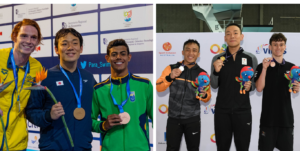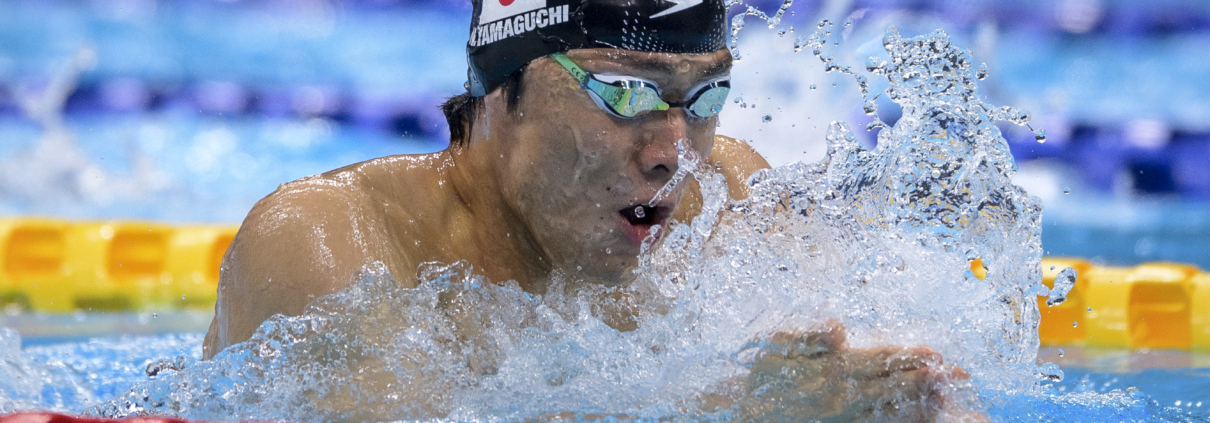Naohide Yamaguchi Aims to Extend His SB14 100m Breaststroke Reign at Paris 2024
Naohide Yamaguchi, a distinguished para swimmer from Imabari-city in Ehime Prefecture, Japan, is gearing up to make a splash at the Paris 2024 Paralympic Games. Living with his parents and supported by his older sister, Naohide’s journey to the pinnacle of para-swimming is both inspiring and remarkable.
Naohide’s love for sports began in childhood which got carried forward in life with the opportunities it provided Noahide with.
“I was a very active child, and I have loved sports since childhood. Swimming is where I can express myself and fully demonstrate my abilities,” Naohide explains.
Training rigorously at a local swim club, he dedicates 2.0-2.5 hours per session, with evening practices on weekdays and early morning practices on weekends. This dedication has paid off in record-breaking achievements and a promising future.
Naohide received his international eligibility with Virtus in January 2019 which opened doors for him at the international elite para-sports competitions.

Yamaguchi dominated the SB14 100m Breaststroke podium at the Madeira 2022 and 2022 Virtus OA Games. Photo Credit: Madeira 2022 and 2022 OA Games.
Naohide made waves at the Tokyo 2020 Paralympic Games by breaking the world record in the SB 100m Breaststroke event with a time of 1:03.77. He continued his record-breaking streak at the 2022 Madeira Para-Swimming Championship, setting a championship record of 1:04.46 in the same event and establishing a Virtus Asia Record in the Men’s 200m Breaststroke II1 category with a time of 2:21.26. As a Paralympic champion and holder of multiple records, Naohide brings exceptional form and unmatched skills to the breaststroke events.
Specializing in breaststroke, Naohide finds the most challenging aspect of his training to be maintaining body balance and shifting weight during swimming.
“The most challenging thing is how I can handle body balance and shift my body weight during swimming,” he notes.
Despite these challenges, he remains undefeated in breaststroke and individual medley (IM) events. For Naohide, swimming is more than a sport—it’s a means of self-expression and personal achievement.
“For me, swimming is something I can fully demonstrate what I have… it is my way of expressing myself and my origin of power,” he says.
As he prepares for the Paris 2024 Paralympic Games, Naohide acknowledges the fierce competition from para swimmers worldwide, especially from Nicholas Bennett from Canada. However, he views his rivals not just as competitors but as his biggest supporters, pushing him to achieve greater heights.
Naohide is grateful for the support from NPC Japan and Virtus, which have provided him with numerous competition opportunities across various countries.
“I am thankful to NPC Japan and VIRTUS for all their efforts in having various competition opportunities in various countries because it helped me a lot. Their efforts have been instrumental in my development as an athlete,” he says.
Naohide aspires to live a positive life, enjoying both swimming and everyday moments. His message to young athletes with intellectual impairments is to embrace the sport, meet new people, and gain diverse experiences, ultimately refining their professionalism and passion.
“Through the sport, I hope they meet people and they experience various things. Then refine their professionalism,” he advises.
As Naohide Yamaguchi prepares to compete at the Paris 2024 Paralympic Games, his journey serves as a beacon of hope and inspiration for athletes everywhere.
Join Virtus’ #MakingInvisibleVISIBLE campaign in making Naohide’s journey Visible.
WHAT IS INTELLECTUAL IMPAIRMENT?
Intellectual impairment is an umbrella term to describe a vast and neuro-diverse group of people with varying types of cognitive impairments including intellectual disability, Down syndrome and autism. Having an intellectual impairment impacts how an athlete understands the rules of the sport, interacts with other players, and adjusts to different environments. They might find it difficult to manage reaction times, remember specific race or game strategies, retain focus for long period of time, or maintaining impulse control.




